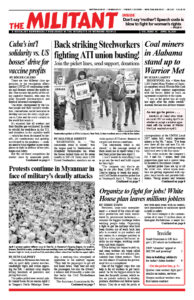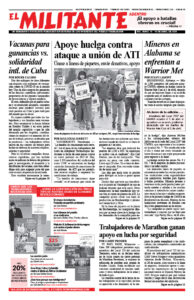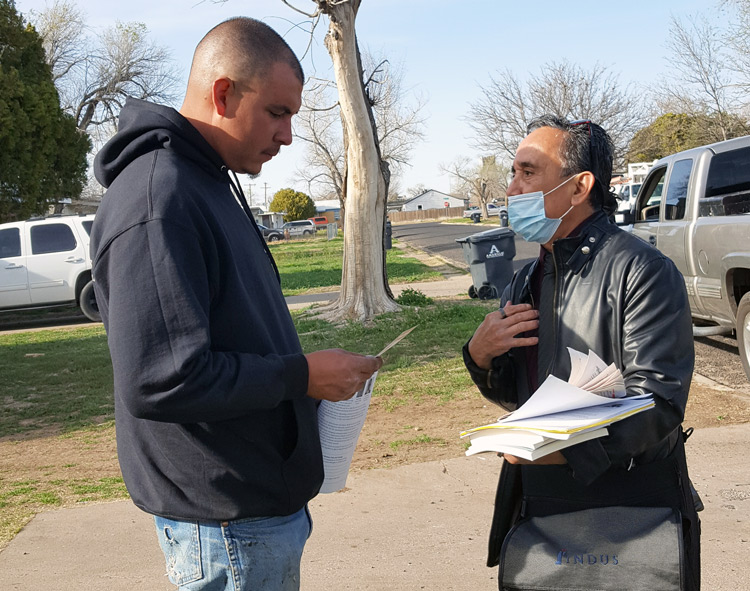AMARILLO, Texas — Gerardo Sánchez, Socialist Workers Party candidate for Dallas City Council, and a team of campaign supporters spoke with a wide range of workers during a campaign visit here March 31 to April 1.
“Workers in Dallas, in Amarillo, across the U.S. and in other countries, need to see and act on our common class interests,” Sánchez told everyone we met.
Sánchez had come to Amarillo before to extend solidarity to the United Steelworkers locked in a bitter nine-month strike against Asarco copper mine bosses here and in Arizona in 2019-20. Like he did then, Sánchez explained the importance of union fights going on today.
“The fight for a union at Amazon in Alabama is an example of what workers at Walmart, where I work, and those at many other workplaces need to do,” Sánchez said. “The same is true for the fight of locked-out Teamsters union members at Marathon Petroleum in Minnesota. They refused to accept the company bringing in nonunion contractors and have been locked out of their jobs since Jan. 22.”
Sánchez had helped get a solidarity message and contributions from his Walmart co-workers for the Asarco strikers. He told people he is doing the same thing today for the Minnesota Teamsters.
This Militant worker-correspondent also had brought solidarity to the picket lines and union actions in Texas and Arizona during the Asarco strike. So we were especially interested in learning what conditions were like in that refinery since the strike ended. Many of the workers are back at work, but the strike hadn’t been able to force the company to withdraw its concession demands.
The first stop was a local cafe where we were treated for breakfast by Leonardo Segura, former vice president of USW Local 5613 and picket organizer.
“There are about 40 workers in the refinery now, working 12-hour shifts, five to six days a week. Before the strike, there were about 160 workers and we worked eight-hour shifts,” Segura said. He retired after Asarco tried to put him on a lower-paying job he wasn’t trained for.
After breakfast Segura took us to the union hall where we were welcomed by former strikers Robert Stine and Liza Tarango. “The strike was worth it. What Asarco was doing wasn’t right,” said Tarango, who had worked there for eight years and still hasn’t been called back. “I don’t regret the strike and would do the same thing again. We hadn’t had a raise in 12 years. It was time to do something.”
We don’t win every fight we’re in, Sánchez told them. But workers can come out stronger, more united, and gain experience in winning solidarity, reaching out to other workers. This is a taste of what is possible when we stand up and fight, he said. That puts working people in the best position to make gains in union battles today and those to come.
Sánchez pointed to the lockout at Marathon and the strike by Steelworkers at ATI as examples of struggles that need solidarity today.
Tarango got a subscription to the Militant to follow these and other labor battles.
We also met Maria England at the union hall. She was laid off by Asarco bosses and is expecting to be called back. “I was a machine operator before the strike. They are working 12-hour shifts now. They have to eat on the job,” she said. “One worker who had no breaks decided to stand up. The union fought this and now he gets breaks.”
Fights like these on the job are important for rebuilding a fighting union movement, said Sánchez.
Workers and our unions also need to “fight for a public works program to put millions to work at union scale wages, building hospitals, schools, affordable housing, revamping the worn-out power plants that collapsed during the freeze in Texas last month, and other things working people need,” Sánchez told England.
Fighting for this, and for a shorter workweek with no cut in pay, can help overcome the biggest divisions the working class faces today — between those who are working and those without a job, said Sánchez.
Doorsteps, plant gate campaigning
Segura joined us in campaigning at the Tyson beef meatpacking plant here. A number of workers laid off by Asarco are now at this plant, which is organized by the Teamsters. “This is a workers’ paper,” Segura told workers as they came off their shift. We sold 11 copies of the Militant. A carload of workers originally from Myanmar, who saw that the Militant covers the fight against the military dictatorship there, bought several copies.
The next day Segura joined us talking to workers on their doorsteps.
“I’m a roofer,” Marcos Mendoza told Sánchez after the Socialist Workers Party candidate introduced himself. “I’m around workers who come from Mexico all the time and I see how they are paid lower wages because the bosses think that they are afraid to speak up.”
“That’s why my campaign supports amnesty for all workers without papers who live and work in the U.S. today,” Sánchez said. “The majority of those coming across the border today are from areas where there’s no jobs and very low wages. The bosses use immigration to divide us and pit us against each other. They pay immigrants poor wages and then drive everybody’s wages down.” Mendoza bought a subscription to the Militant.
Sánchez also knocked on the door of Chris Null and told him about the organizing drive at the Alabama Amazon warehouse. “I was laid off by Amazon here seven months ago,” Null said. After discussing the need for workers to fight back, including politically, Null got a copy of The Clintons’ Anti-Working-Class Record: Why Washington Fears Working People and a Militant subscription.
Party campaigners plan to keep in touch with the former Asarco strikers and other workers they met in Amarillo, to work together to build solidarity with working-class battles wherever they break out.


